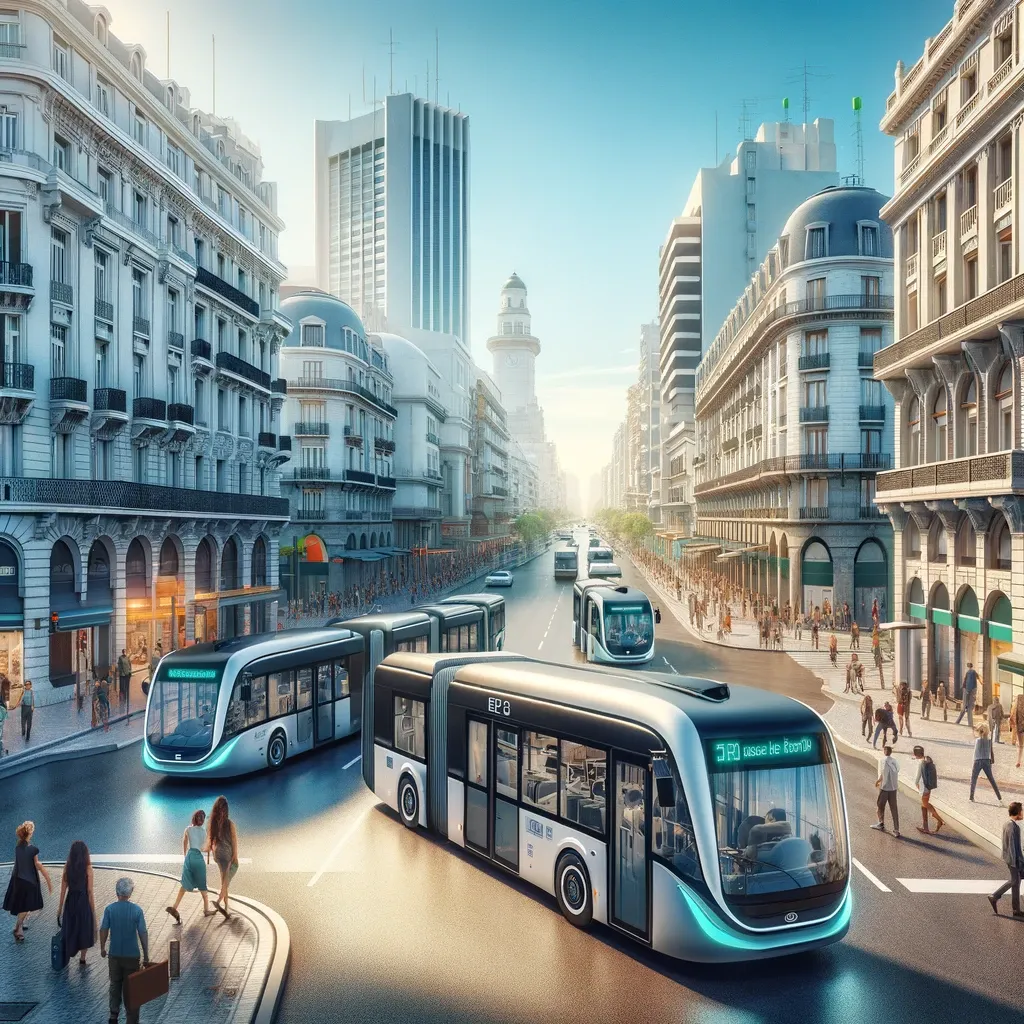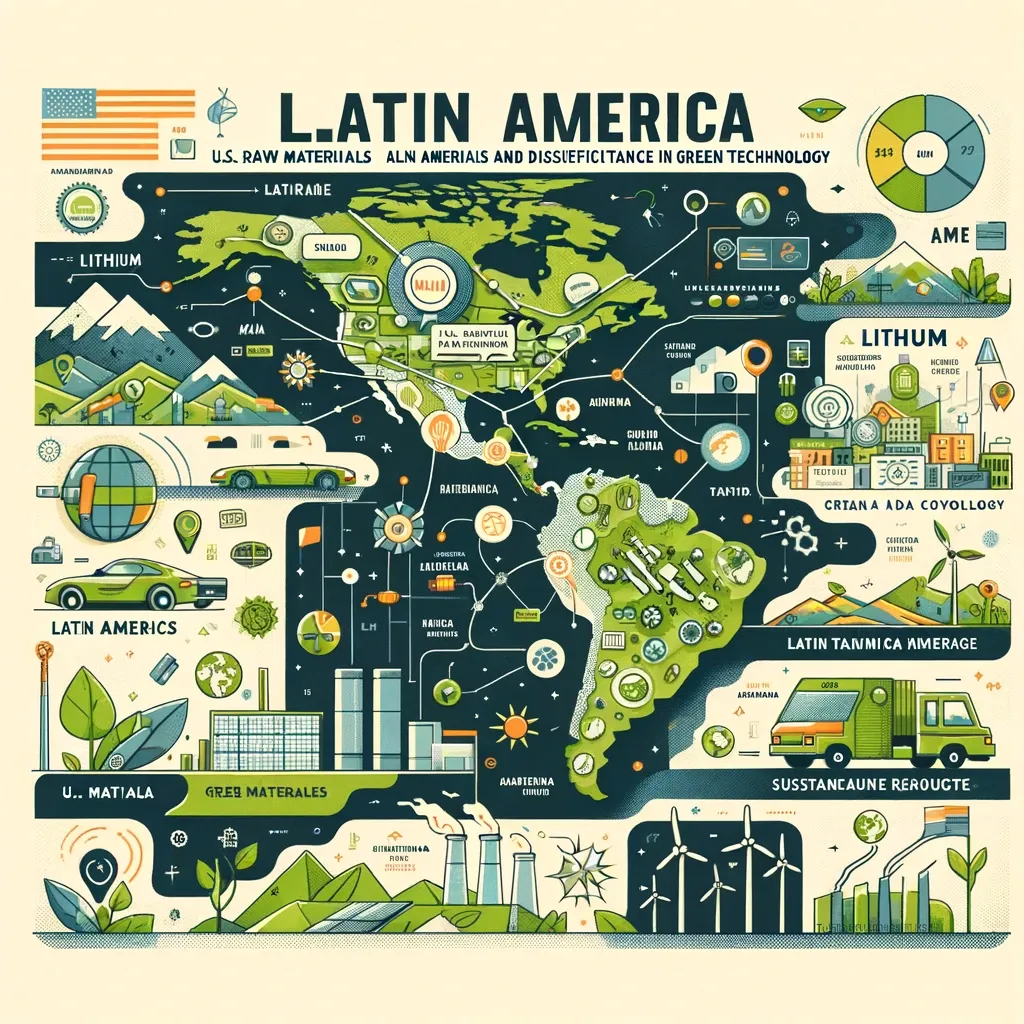Empowering U.S.-LATAM Trade with Uruguay's Green Energy Revolution
Uruguay: The Small but Mighty Powerhouse in Renewable Energy
Discover how Uruguay's pioneering renewable energy initiatives are fueling a sustainable economic boom, setting a model for U.S.-LATAM trade relations in the green recovery era.

A bustling urban environment in Montevideo, Uruguay, showcasing the city's commitment to sustainable transportation with modern electric buses
Introduction
Uruguay stands at the forefront of the renewable energy revolution, showcasing a model of sustainability that has the potential to redefine U.S.-LATAM trade relations. As the world seeks pathways to green recovery post-Covid-19, Uruguay's commitment to wind and solar power emerges as a beacon of hope for sustainable development and economic growth.
The Heart of Uruguay's Renewable Energy Success
In the heart of South America, Uruguay has embarked on an innovative journey, harnessing the power of the wind and sun. With over 97% of its electricity generated from renewable sources, Uruguay's energy landscape is a testament to visionary policies and international cooperation. This success story is not just about energy; it's about creating a sustainable economic boom that resonates with the broader goals of U.S.-LATAM trade relations in renewable energy.
U.S.-LATAM Trade Relations and Renewable Energy: A Synergistic Path Forward
The synergy between the U.S. and LATAM in renewable energy is pivotal for regional economic recovery and sustainable growth. Uruguay's achievements in renewable energy offer a model for partnership, where innovative projects, electric highways and green infrastructure pave the way for a greener future. By integrating "U.S.-LATAM trade relations in renewable energy" into our dialogue, we underscore the importance of collaboration in achieving our green recovery objectives.
Fueling a Sustainable Economic Boom
Uruguay's renewable energy revolution is more than an environmental win; it's a cornerstone for a sustainable economic boom in U.S.-LATAM trade relations. The country's commitment to green energy serves as a model for LATAM, showcasing the potential for economic growth fueled by sustainable practices. By emphasizing Uruguay's role in a green recovery for LATAM, we highlight the interconnectedness of environmental sustainability and economic resilience.
Innovative Projects and Electric Highways: Leading by Example
Uruguay's dedication to renewable energy is evident in its innovative projects, such as electric highways. These projects exemplify how Uruguay is leading by example, contributing to a larger, regional sustainable economic boom and setting a precedent for U.S.-LATAM trade relations.
Uruguay’s Renewable Energy Landscape
Until 2007, Uruguay heavily relied on energy imports from its South American neighbors due to limited energy resources. However, forward-looking policies transformed its energy landscape, with a remarkable shift towards renewables, particularly wind and solar power. By 2017, Uruguay had nearly 4,000 megawatts of installed wind power capacity, a significant leap from having virtually no wind power a decade earlier.
Geographical and Environmental Advantages
Uruguay's geographical position and environmental conditions have been pivotal in its renewable energy success. The country's landscape, abundant sunshine, and extensive coastline provide ideal conditions for solar, wind, and hydraulic power generation. Uruguay's commitment to local energy production, especially solar energy in rural areas, has been instrumental in expanding its renewable energy reach.
Legislative and Economic Incentives
The government's legislative support and economic incentives have played a crucial role in this energy shift. Laws established as early as 1998, along with significant tax reductions, have encouraged renewable electricity generation and manufacturing of renewable energy equipment.
The International Perspective
On the global stage, Uruguay's renewable energy achievements have not gone unnoticed. The country's commitment to carbon neutrality by 2030 has set a high bar for environmental stewardship and sustainable development. This commitment is bolstered by innovative projects like the "electric highways" initiative, which integrates electric vehicle infrastructure into the national grid.
Impact on Job Creation and Economic Growth
Uruguay's renewable energy sector is not just an environmental success story; it's a blueprint for economic growth. The renewable energy transformation has created job opportunities, both in Uruguay and potentially in Latin America, as part of broader U.S.-LATAM partnerships. This growth in renewable energy-related employment can help reduce illegal immigration into the U.S. by providing stable, sustainable job opportunities in Latin America.
Uruguay and Regional Energy Integration
Uruguay's approach to renewable energy is not just about national progress; it's about regional integration. By sharing its expertise and resources, Uruguay can play a vital role in a larger regional energy transformation, contributing to energy security and cost benefits through regional integration.

A rural setting in Uruguay, with traditional farmhouses equipped with solar panels. The contrast between the rustic architecture and modern solar technology symbolizes Uruguay's nationwide adoption of renewable energy, even in remote locations.
The Future Outlook
As we chart a course for a sustainable future, Uruguay's renewable energy initiatives offer valuable lessons for U.S.-LATAM trade relations. By embracing green recovery and innovative projects in renewable energy, we can fuel a sustainable economic boom that benefits our planet and economies alike. Let's take inspiration from Uruguay's green energy revolution to foster a more sustainable and prosperous U.S.-LATAM partnership.
Conclusion
Uruguay's renewable energy journey is a testament to what can be achieved with vision, ambition, and strategic policy-making. As a model of sustainable energy development, Uruguay not only stands out in Latin America but also on the global stage, offering a blueprint for other nations aspiring to transition to a more sustainable and prosperous future.
=====
Did you know?
Did you know that U.S. Small and Medium Enterprises (SMEs) can explore innovative revenue streams in Uruguay's renewable energy sector through advanced AI Marketing techniques? As Uruguay pioneers in sustainable energy, it opens up a realm of opportunities for U.S. businesses equipped with AI-driven marketing strategies.
One unique approach is leveraging AI for market segmentation and personalization. AI tools can analyze Uruguay’s consumer behavior regarding renewable energy, allowing U.S. SMEs to create highly targeted marketing campaigns. For instance, if certain demographics in Uruguay show a keen interest in solar energy solutions, AI can help tailor marketing content to appeal specifically to these groups.
Additionally, AI can be pivotal in identifying cross-sectoral collaboration opportunities. By analyzing industry trends and business data, AI might reveal potential partnerships between U.S. SMEs and Uruguayan companies in sectors like technology, manufacturing, or even education, all revolving around renewable energy.
AI-driven content creation can also play a crucial role. By generating insightful and engaging content that highlights the benefits of U.S. renewable energy technologies and services, AI can help position U.S. SMEs as key contributors to Uruguay’s energy revolution. This content can be strategically distributed across digital platforms to maximize reach and impact.
Moreover, AI Marketing offers capabilities in predictive analysis, enabling U.S. SMEs to anticipate market shifts and consumer needs in Uruguay's renewable energy sector. This foresight allows for proactive strategy adjustments, ensuring that U.S. businesses remain relevant and competitive.
Furthermore, AI can enhance digital advertising strategies, optimizing ad placement to target Uruguayan audiences most likely to engage with renewable energy products and services. This ensures more efficient use of advertising budgets and higher ROI for U.S. SMEs.
Lastly, AI can assist in localizing marketing efforts. Beyond mere translation, AI can adapt marketing materials to align with Uruguay's cultural and social context, significantly increasing the effectiveness of these campaigns in resonating with the local audience.
By harnessing these AI Marketing strategies, U.S. SMEs can not only contribute to Uruguay's renewable energy landscape but also carve out a significant presence in a growing market, fostering robust U.S.-LATAM partnerships and job creation.





























